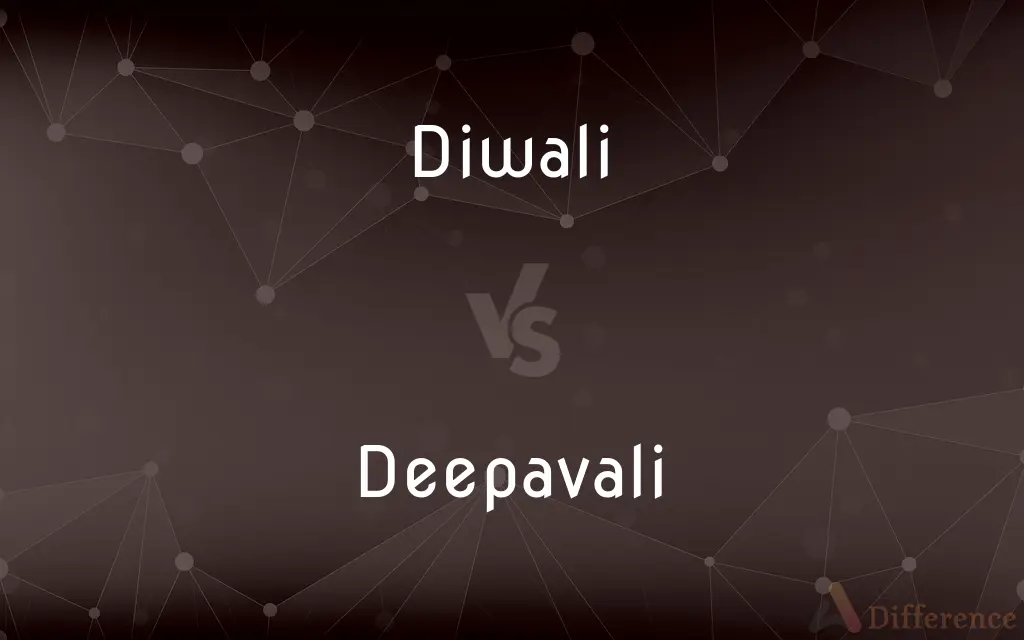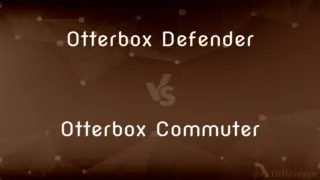Diwali vs. Deepavali — What's the Difference?
By Tayyaba Rehman — Published on January 19, 2024
Diwali and Deepavali refer to the same Hindu festival of lights, with "Diwali" being the more popular name globally and "Deepavali" used predominantly in South India and certain other regions.

Difference Between Diwali and Deepavali
Table of Contents
ADVERTISEMENT
Key Differences
Diwali is the term widely used internationally for the Hindu festival celebrating the victory of light over darkness. Deepavali, derived from Sanskrit, means "a row of lamps," indicating the same festival but with a more traditional name.
The name Diwali is a shorter form, more commonly used in North India, signifying the festival's essence in a concise way. Deepavali, on the other hand, is preferred in South India and certain parts of Southeast Asia, retaining the original Sanskrit phonetics.
Diwali is celebrated with lighting lamps, fireworks, and the distribution of sweets, embodying joy and prosperity. Deepavali, while denoting the same festival, emphasizes the lighting of earthen lamps ('diyas') in a row, reflecting its literal meaning.
Both Diwali and Deepavali symbolize the spiritual "victory of light over darkness, good over evil, and knowledge over ignorance.” However, the term Deepavali is often associated with more traditional and religious aspects of the festival.
In essence, Diwali and Deepavali have no difference in terms of how the festival is celebrated or its significance; the distinction lies mainly in the regional linguistic preference.
ADVERTISEMENT
Comparison Chart
Linguistic Origin
Shortened form, popular in North India
Traditional Sanskrit term
Regional Preference
Globally recognized, North India
South India, parts of Southeast Asia
Emphasis in Name
General celebration of the festival
Focus on lighting lamps in a row
Cultural Connotation
Broader, more inclusive term
Often linked with traditional practices
Pronunciation
"Di-wali"
"Deep-a-vali"
Compare with Definitions
Diwali
A major Hindu festival celebrated globally.
We decorate our home with lights and candles during Diwali.
Deepavali
A traditional name for the Hindu festival of lights.
We light rows of diyas during Deepavali.
Diwali
Known as the festival of lights.
Diwali symbolizes the victory of light over darkness.
Deepavali
A time of renewal and cleansing.
Many clean their homes and wear new clothes on Deepavali.
Diwali
Celebrated with fireworks and sweets.
The sky is filled with fireworks on Diwali night.
Deepavali
Celebrated by lighting lamps and distributing sweets.
Deepavali is a time for sharing joy with sweets and lights.
Diwali
Marks the triumph of good over evil.
Diwali teaches us the importance of goodness and truth.
Deepavali
Represents knowledge over ignorance.
Deepavali is a reminder to enlighten our inner self.
Diwali
A time for family gatherings and prayers.
Families come together to pray and celebrate Diwali.
Deepavali
Emphasizes the spiritual aspect of the festival.
Deepavali rituals include special prayers and offerings.
Diwali
A five-day festival observed by Hindus, Sihks, and Jains in late October or early November to celebrate the triumph of light over darkness and of good over evil. Also called Festival of Lights.
Common Curiosities
What does Deepavali mean?
Deepavali, meaning "a row of lamps," is the traditional name for the Hindu festival of lights.
What is Diwali?
Diwali is a Hindu festival known as the festival of lights, symbolizing the victory of light over darkness.
Is Diwali celebrated outside India?
Yes, Diwali is celebrated globally by the Indian diaspora and others.
How is Deepavali different in South India?
Deepavali in South India may include more traditional rituals and is often celebrated a day earlier than in North India.
Why is Diwali celebrated?
Diwali is celebrated to honor the triumph of good over evil and light over darkness.
Are Diwali and Deepavali the same festival?
Yes, they refer to the same festival; the difference lies in regional language preferences.
What foods are associated with Diwali?
Sweets and savory snacks are commonly prepared and shared during Diwali.
Is Diwali a public holiday?
Diwali is a public holiday in many countries with significant Hindu populations.
How long does Diwali last?
Diwali is typically celebrated over five days.
Is gift-giving a part of Deepavali traditions?
Yes, exchanging gifts is a common practice during Deepavali.
What are the common traditions of Deepavali?
Deepavali involves lighting lamps, distributing sweets, and performing religious rituals.
Do people wear new clothes on Deepavali?
Yes, wearing new clothes is a common practice during Deepavali.
What is the spiritual message of Diwali?
Diwali carries the message of the victory of light over darkness, good over evil, and knowledge over ignorance.
What is the significance of lamps in Deepavali?
Lamps symbolize the light within us, representing knowledge, goodness, and a spiritual journey.
Can non-Hindus celebrate Diwali?
Yes, Diwali is a cultural festival that many people enjoy regardless of their religious background.
Share Your Discovery

Previous Comparison
Otterbox Defender vs. Otterbox Commuter
Next Comparison
Daily Harvest vs. HungryrootAuthor Spotlight
Written by
Tayyaba RehmanTayyaba Rehman is a distinguished writer, currently serving as a primary contributor to askdifference.com. As a researcher in semantics and etymology, Tayyaba's passion for the complexity of languages and their distinctions has found a perfect home on the platform. Tayyaba delves into the intricacies of language, distinguishing between commonly confused words and phrases, thereby providing clarity for readers worldwide.
















































